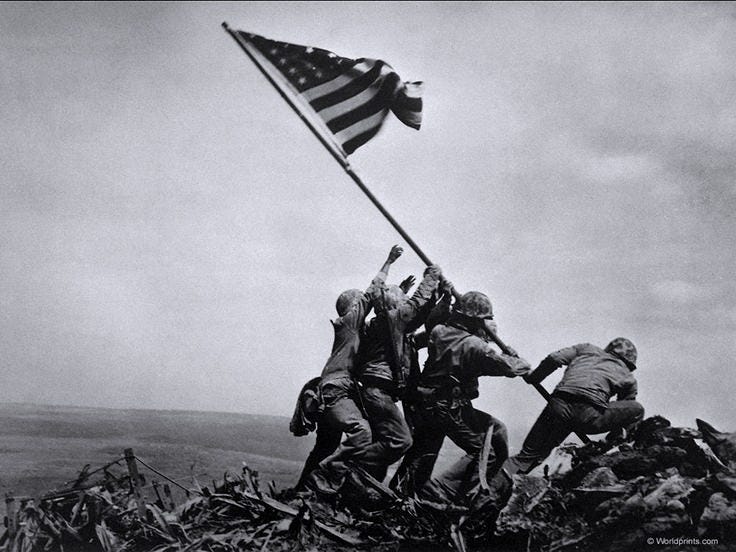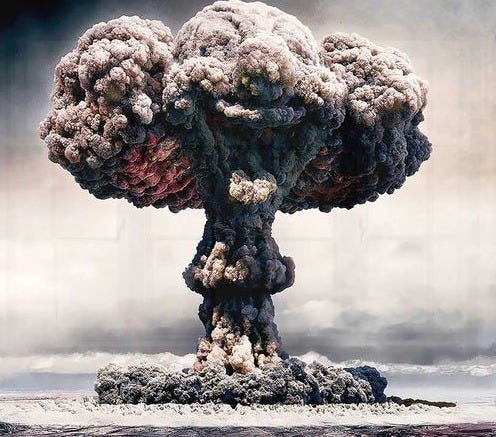The 51st.
Will Trump’s Expansionism into Canada Serve as the Final Catalyst for a Third World War?
Whenever we learn about war in retrospect, by observing history, it’s incredibly easy to condense years of devastation, death, and political upheaval into a single event in our minds, to where a long chain of events begins to appear more singular. As forgetful as we are, it goes unrecognised for the most part, that our tendency to simplify events in this way is entirely useless to us now. Actually, where ‘knowledge is our greatest weapon’, it would probably be more accurate to say that our forgetfulness almost disarms us now.
Ideas about a possible third world war have been circulating for some time now, so much so that it feels we’ve lumped this very real threat into the place where conspiracies of a looming biblical annihilation go, right next to news that every few years, there is a new meteor coming to destroy us. But where the threat of war differs from the others, not necessarily for it’s plausibility (even though it is plausible), it differs in the way that the threat doesn’t come all at once. If God were to somehow strike us down, his anger wouldn’t likely waste time getting us acquainted with the idea. Or if a comet were to destroy us all, we’d be gone in a matter of minutes, the slate wiped entirely clean. But the thing about wars is, that they can be made up of a series of seemingly smaller, less consequential battles, right up until we greet her at our front doors. We have seen a number of significant events occurring since the inauguration, the most significant of which might just be the match to our powderkeg.
For citizens in Canada now, notions of war aren’t some far off, abstract notion, but rather loom as a potential, very real possibility. Trump's threat to use "economic force" to turn Canada into part of the United States represents the most significant challenge to Canadian sovereignty since the War in 1812. Trump, who has floated the idea of territorial expansion, has suggested acquiring Greenland, the Panama Canal, and even crushing Canada economically if it doesn’t comply with U.S. demands. Although initially dismissed by some as a joke or negotiation tactic, by none other than those like comedian Jimmy Fallon in the latest segment of Fallon Tonight, jesting,
“This year’s Superbowl will be watched in 180 countries, well 179 if we take over Canada by Saturday”.
The more cavalier approach to high-stakes maneuvering might help to temporarily dissolve fears of a forced expansion, almost intentionally so, in alignment with the Trump administrations long-standing and successful tactic; appearing more senseless than dangerous. But at the same time, Trudeau and other political leaders having firmly rejected the idea of Canada becoming the 51st state, perceive a real danger here. Trudeau, having been caught ‘on a hot mic’, reportedly claiming that his concerns about a potential invasion were far from futile. Trump's approach threatens their sovereignty, raising existential questions for the nation. As Canada prepares for a federal election, the situation recalls the War of 1812, where small forces successfully held off American incursions, and Canadians may need to revisit lessons from history to confront the current crisis.
But I’ve been hearing whispers that on the other side of the border, the average American citizen goes on about their daily life, this information simply under emphasised their daily morning announcements. Living in the UK,
[My knowledge of just how restricted daily news is in the current air of censorship is bound to be somewhat limited, so for those of you based in the U.S, further insight here would be appreciated].
Like former expansionist efforts initiated by the U.S. government, Americans will know the war has begun after narratives surrounding it’s aggravator have been distorted, by which time stereotypes have been so carefully interwoven into everyday language about ‘the others’,
Prior to the Mexican-American War, resulting in the concession of lands now known as California, Arizona, New-Mexico, expansionist desires were largely the catalyst for a conflict resulting in casualties up to 40,000. Only those born long after, will simply have the misfortune of being governed by a president determined to vilify the native population. After this war in the mid-nineteenth century, came others of similar proportions, like the violent exertion over the Philippines in 1899, U.S. involvement in the Vietnam War in 1955, as well as instances of the ongoing effort to cripple the middle-east during the ‘War’ against Iraq.
So it’s clear that fears surrounding war are nothing if not well-substantiated. Still, I do wonder if the practice of vilification will appear more transparent this time because the face of the ‘threat’ against U.S. expansionism won’t be divided from the average white American by race, or class, or religion. Of course, it has been easy for colonial powers to adopt a certain …creativity in their divisiveness, and so who's to say it’ll be hard for Trump to vilify a Canadian resistance going forward.
The questions about ‘World War III’ should be geared towards asking ‘when’ or ‘what’ rather than ‘if.
When will it become official?
What will the catalyst be?

Asisa









This is the first article I've read since I joined Substack a week ago.
Very lovely read and I agree with the sentiment that small inconsequential battles. For example before the first world war there was a civil war in America between the North and South.